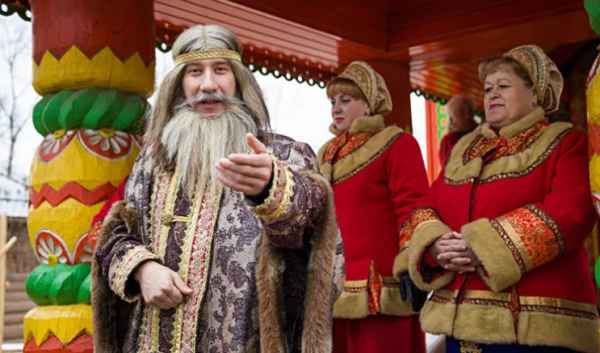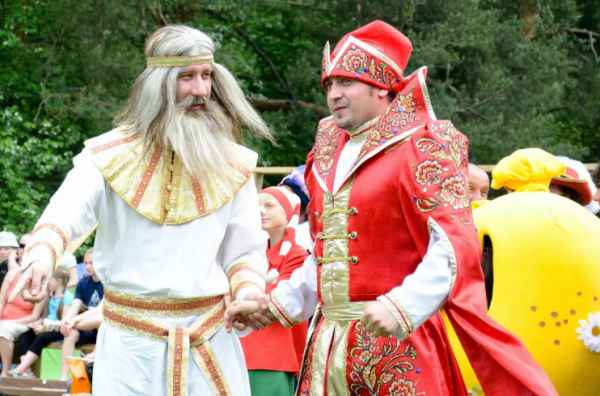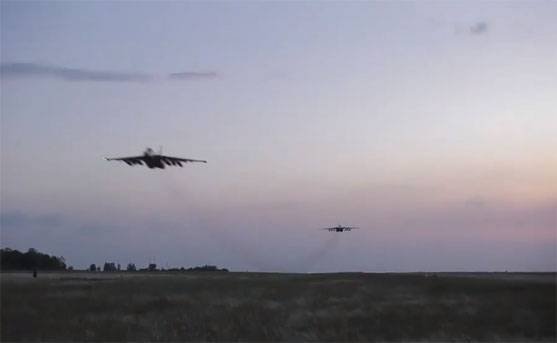
When one says the word "Berendei", most of the people in our country is something generalized Old Russian, fairy. Whether the tribe some kind Vyatichi or Radimichi, whether something related to Russian folk tales. By the traditions of Russian culture and appealing vocal-instrumental ensemble "Berendei", formed by the Moscow Institute of Forestry in the early 70-ies. HH century.
Truth in these views have. Indeed word 'Berendei "was first mentioned in" The Tale of Bygone Years "under 1096 year. they are mentioned as a military force, involved in the internecine struggle, Blinding razrazyvsheysya after Prince Vasylko Terebovlskoho. Not familiar with the ancient Russian chronicles reader may be quite surprised: Berendei there mentioned as nomadic Turkic tribes, It is led by Tork and pechenegy. And, Berend was especially close, as it appears, Torquay - Turkic tribe, speak the language, belonged to the Oguz subgroup of the Turkic languages. To this group belong to the language, eg, modern Turkish, Azerbaijani and Turkmen languages.
On the closeness of Torquay and Berendeys shows some facts.
At first, in various military conflicts, described in Russian chronicles, Torquay Berendei and are always on the same side of the barricades. Polovtsы (people, also spoke the Turkic language, but belonged to another branch, related to modern Tatars) sometimes appear in alliance with Torquay and Berendeys, and sometimes feuding. So, eg, in "The Tale of Bygone Years" reported, what in 1105 , the famous Polovtsian Khan Bonyak went on a campaign to Torquay and Berendeys. The results of this campaign have not been announced, but the fact of confrontation and Torquay Berendeys on the one hand, and Polovtsian other already very revealing.
Secondly, in a Tale of Bygone Years mentions Torchin, Ovcharov (ie. servant, responsible for the safety of the herd of sheep) Prince Svyatopolk Yzyaslavycha. this Torchin (ie. a man from the tribe of Torquay) It turned out to be the main actor in the glare Prince Cornflower Terebovl. It was he who wielded the knife, vykalyvaya Vasilyek eyes. This Torchin named for - his name was Berendey. That is the word "Berendey" could be not only the ethnonym, but also the personal name. From this we can conclude, berenedi that might not be a separate people, and certain ethno-political group, was named after the leader-founder. Likewise received their ethnonym Nogais, whose name is associated with the Golden beklerbekom Nogai, who lived in the XIII century. I.e, such a practice within the Turkic civilization existed, Consequently, It could be realized in the case of Berendeys.
Berendei originally lived on the south-western borders of Russia, so they appear very often in the internecine clashes South Russian princes. However, mobility of nomadic troops allowed them to move easily in different directions. AT 1146 year they took part in the capture of Kiev Monomakh representative branch of the Rurik - Izyaslavom Msislavichem. Since the Russian princes often used military force Berendeys and other nomadic peoples in their wars, part of the nomads had settled on the banks of the river Ros. Collectively, they became known as "Black Hats". The word "hood" now means a monastic headdress, but in the ancient Russian so-called cap any. obviously, is the name arose because, nomads, Indeed, They wore black hats.
These place names suggest, that in the future of the Berendeys (yet again, as an important military resource) It was moved by Yuri Dolgoruky and Andrew Bogolyubsky the territory of the North-Eastern. The memory of this store, eg, Berendeevo name of the village in the Yaroslavl region.
After the Mongol invasion Berendeys name disappears from the annals. Obviously Tokra and Berendeans, continues to lead the steppe, nomadism, They were involved in the formation of the Tatar population of the Golden Horde, and a, who was in the depths of Russian territories, gradually dissolved in Slavic weight.

the question remains: why Berendei in the mass consciousness, Turkic-speaking nomads, They appear in the form of some "fabulous Slavs", and no enemies-steppe?
All the fault of the great Russian writer Alexander Ostrovsky (1823 – 1886). Yes, that very, who wrote "The Storm" (remember: Catherine, "A ray of light in the darkness," etc., It is known to all since high school). In addition to this remarkable piece, Ostrovsky is the author of several dozen works, among which it occupies a prominent place of romantic verse play "The Snow Maiden", first staged at the Bolshoi Theater 1873 g. It is in this play Berendei of the ancient Turkic-speaking nomads turned into a fairy Slavs. The play featured "Nina suburb Berendeevka", its inhabitants - "Berendei", and even "the king Berenedey".
Why Ostrovsky came up to his imaginary people is strange (frankly, absolutely not appropriate within the meaning of) name? It is not known. Likely, This pushed him to the title of the said village near native Russian ancient city of Yaroslavl. by the way, It is only three hundred kilometers from his estate Shchelykovo. I did not know the writer, it is completely foreign Yaroslavl land among Russian names. A may know, Ostrovsky was well founded, but it caught the word, from which breathes antiquity and fairy tale.
Especially popular history, invented Ostrovsky, I received after, how in 1968 was a remarkable Soviet actor and director Pavel Kadochnikov, shot a film-tale "Snow Maiden", that not once looked all Soviet children. Kadochikov himself starred in a wise king Berendey. colorful decorations, talented actors play, all this made a great impression on the audience. Thus, and entrenched in the public consciousness bright, but the wrong way "fabulous Slavs Berendeys".
Author: Vadim Dolgov - Russian historian and writer. Doctor of Historical Sciences, Professor.











